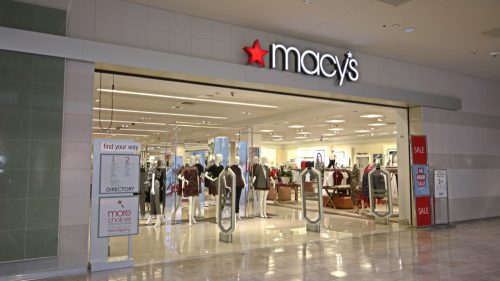Kohl’s, Macy’s, and Nordstrom Are All Getting Rid of This Now

Department stores were a mecca for shoppers for much of the 20th century, but their heyday is now firmly in the rearview mirror. The demise of department stores has been ongoing for more than a decade now, and it was only exacerbated by the COVID pandemic. According to The Washington Post, roughly 40 percent of all department stores in the U.S. have closed since 2016—with some companies like Barney’s and Lord & Taylor going out of business entirely. But even the major chains that have managed to survive are facing setbacks. Now, big names like Kohl’s, Macy’s, and Nordstrom are all trying to stay afloat in the face of new challenges. Read on to find out what these department stores are now getting rid of.
READ THIS NEXT: 7 Secrets Kohl’s Doesn’t Want You to Know.
Inflation is severely affecting shoppers right now.

Inflation in the U.S. has been on a concerning trajectory this year. The nation’s annual inflation rate hit 9.1 percent in June, which is the highest increase in 40 years, according to the U.S. Bureau of Labor Statistics (BLS). And even with inflation falling to 8.5 percent in July, the impact is still being felt, especially when it comes to how consumers are spending their money. According to market research firm The NPD Group, more than 8 in 10 shoppers are planning to rethink or reduce their product spending in the next three to six months amid inflationary pressures, CNN reported.
“There is a tug-of-war between the consumer’s desire to buy what they want, and the need to make concessions based on the higher prices hitting their wallets,” Marshal Cohen, chief retail industry advisor for NPD, told the news outlet, noting that shoppers have turned away from buying many non-essentials. As a result, Kohl’s, Macy’s, and Nordstrom have all reported weaker consumer spending recently—which is creating problems for the department stores.
Department stores are lowering their expectations for the year.

Kohl’s, Macy’s, and Nordstrom have all now lowered their annual forecasts for 2022. Kohl’s said they now expect annual net sales to decline 5 to 6 percent compared to last year, Macy’s dropped its outlook for net sales from $24.7 billion to $24.5 billion, and Nordstrom lowered its revenue growth outlook by 1 percent.
All three department stores cited the decline in consumer spending as the main catalyst for cutting yearly expectations. “The consumer is not as healthy as they were in prior quarters,” Macy’s CFO Adrian Mitchell told analysts on a conference call, per CNBC. “We have seen declining retail traffic in areas of weakening apparel sales over the quarter as the consumer faces higher costs on essential goods, particularly grocery.”
RELATED: For more up-to-date information, sign up for our daily newsletter.
These stores are now facing a new problem.

As Macy’s explained to Bloomberg, there is another reason these department stores are revising their yearly outlooks: “The level of inventory within the industry.” Kohl’s said its inventory is 48 percent higher than it was last year, while Macy’s said its inventory has increased by 7 percent and Nordstrom said its inventory has climbed up by 10 percent in the last year, NBC News reported.
According to The New York Times, consumers cutting down on their spending because of high inflation has left retailers stuck with more inventory than they need. A higher rate of returns made last year and supply chain delays have also added fuel to the fire. “It’s unprecedented,” Chuck Johnston, a chief strategy officer at goTRG, told the newspaper. “I have never seen the pressure in terms of excess inventory as I am seeing right now.”
Retailers are now working to get rid of excess inventory.

Despite forecasts already being lowered, a surplus of inventory could further hurt the department stores’ annual revenue. To avoid that outcome, Kohl’s, Macy’s, and Nordstrom will need to work to get rid of their excess inventory—which may benefit you in the end. Kohl’s CEO Michelle Gass said the company’s plan to get more “aggressive” on clearing excess inventory will include increased promotions for shoppers, according to NBC News. “We acknowledge that many others are taking similar actions, which will likely make for a more promotional environment in the near term,” Gass said.
Macy’s is focusing specifically on discounting “pandemic-related” categories, such as activewear, sleepwear, and home goods, as well as lowering prices on private-brand merchandise and seasonal goods, The New York Times reported. “We’re responding to make sure that our customers are getting the fair value, and we’re liquidating the inventory that needs to be out by a certain date,” Macy’s CEO Jeff Gennette told the newspaper.
During a recent earnings call, Nordstrom’s CEO Erik Nordstrom said that it will also get “aggressive” about getting rid of is inventory, MarketWatch reported. According to Nordstrom, planned markdowns with affect both its main business and Nordstrom Rack, as the company has “clearance in both banners that we need to clean up.”